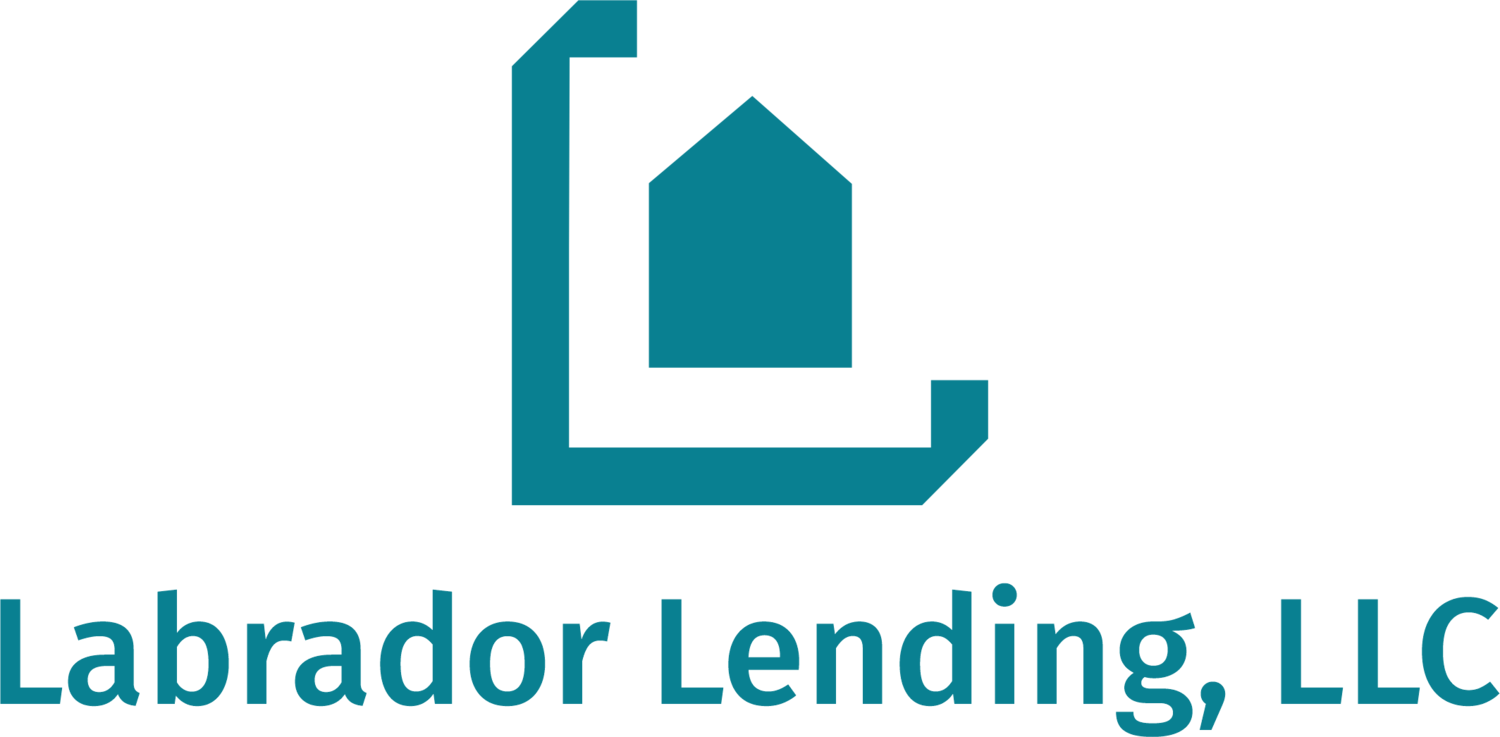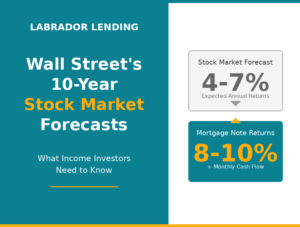Skip to content
Mortgage Note Investing: The Income Strategy High-Net-Worth Investors Are Using
How accredited investors are leveraging mortgage note funds for stability, cash flow, and peace of mind.
When market headlines scream volatility and traditional portfolios feel like a roller coaster, high-net-worth investors don’t panic — they pivot.
Behind the scenes, a growing number of accredited investors are reallocating capital into an often-overlooked strategy that delivers what most investments can’t in today’s economy: monthly income, security backed by real estate, and consistency.
Welcome to mortgage note investing — a time-tested approach once reserved for banks and institutions, now available to accredited investors seeking predictable cash flow and capital preservation.
What Is Mortgage Note Investing?
A mortgage note is the loan (the debt) secured by a piece of real estate. Instead of owning the property, you own the right to receive payments from the borrower. Funds in this space typically buy notes at a discount and manage them for cash flow and outcomes.
Key types of notes:
- Performing: Borrower is paying on time.
- Re-performing: Borrower was delinquent, now back on track after a modification or similar workout.
- Sub-performing: Payments are inconsistent (late/partial). May require active management to stabilize.
- Non-performing: Borrower isn’t paying; manager works toward workout options or pursues contractual remedies.
Why High-Net-Worth Investors Like This Strategy
- Income-first: Designed to generate predictable monthly distributions (fund-dependent).
- Downside protection: Investments are secured by real estate; managers can work out loans or foreclose per contract and state law if needed.
- Discounted entry: Buying at a discount can create a margin of safety and potential equity cushion.
- Lower correlation: Returns are driven by borrower performance and asset management — not daily market sentiment.
- Diversification: Exposure to many loans across geographies and borrower profiles within a single fund.
Quick take: Instead of betting on appreciation, you’re prioritizing cash flow + principal protection mechanics.
How Mortgage Note Funds Work
Acquire at a discount
The fund buys a pool of mortgage notes below face value.
Triage & servicing
Each loan is analyzed; servicing and loss-mitigation strategies are put in place.
Workouts & modifications
Managers may adjust terms to help borrowers succeed and restore payments.
Cash-flow management
Performing and re-performing loans generate monthly cash flow.
Collateral-backed remedies
If a borrower can’t or won’t pay, the fund can pursue collateral remedies per the loan documents and local laws.
Investor distributions
Net cash flow (after fees/expenses) is distributed per the fund’s offering documents.
Potential Risks to Understand
Illiquidity
Private funds may have lock-up periods or limited redemption opportunities, reducing access to capital vs public investments.
Manager execution
Performance depends on underwriting quality, servicing effectiveness, and workout strategies.
Legal & regulatory complexity
Rules vary by state and loan type; experienced management and compliance are critical.
Valuation & pricing risk
Especially relevant for non-performing assets where timelines and pricing are uncertain.
Macroeconomic factors
Unemployment, interest rates, inflation, deal flow, and regional housing trends can impact performance.
Mitigation Levers
Experienced servicers, diversified pools, conservative underwriting, strong collateral documentation, and transparent reporting can help manage these risks.
What to Look for in a Mortgage Note Fund (Due Diligence Checklist)
- Strategy clarity: Which note types, geographies, and deal sizes?
- Track record & team: Prior cycles, loss-mitigation experience, references.
- Underwriting rigor: Collateral file reviews, data tapes, BPO/appraisal practices.
- Servicing & compliance: Licensed servicers; borrower-friendly but firm processes.
- Fee structure & alignment: Management/performance fees; skin in the game.
- Reporting cadence: Granular, periodic updates you can understand.
- Liquidity terms: Lockup, redemption rules, gates.
- Audit & administration: Third-party admins; bank/custody relationships.
- Tax considerations: Structure (e.g., LLC or C-Corp) affects K-1 vs 1099 — consult your tax advisor. SDIRAs can be attractive (especially funds that do not use leverage).
Mortgage Note Funds vs. Other Income Options (High-level View)
| Feature | Mortgage Note Funds | Dividend Stocks | Rental Real Estate | Bonds |
|---|---|---|---|---|
| Primary goal | Monthly cash flow, capital preservation | Income + equity upside | Rent + appreciation | Fixed coupon income |
| Backed by | Real estate collateral (the loan) | Corporate performance | Physical property | Issuer’s credit |
| Volatility | Typically lower correlation to equities | Market-driven | Property/market-specific | Interest-rate & credit risk |
| Hands-on | Manager handles servicing/workouts | Low | High (tenant/repairs) unless outsourced | Low |
| Key risks | Workout/servicing execution, illiquidity | Price swings, dividend cuts | Vacancies, capex, management | Duration, rate changes, default risk |
| Access | Private funds (accredited more common) | Public markets | Direct ownership or syndications | Public markets |
This comparison is for educational purposes and not investment advice. Each investment involves risk; review offering documents and consult professional advisors.
Labrador Lending’s Mortgage Note Investing Strategy
Our strategy centers on acquiring residential mortgage notes — performing, re-performing, and select non-performing — at steep discounts, often well below face value. By building a portfolio across regions, property values, and borrower profiles, we aim to manage risk and maximize income durability.
We focus primarily on performing and re-performing notes while selectively acquiring non-performing loans with strong potential. Our hands-on approach works directly with borrowers to restructure plans, restart cash flow, and transform non-performing notes into income-producing assets.
Types of mortgage notes we invest in
- Performing Notes: Immediate and predictable cash flow.
- Re-Performing Notes: Back on track through workouts; may be held for income or sold.
- Non-Performing Notes: Managed toward resolution via workouts or collateral exits.
Benefits of our Mortgage Note Fund — The Integrity Income Fund
Collateral Protection
First-position liens provide priority claims if a borrower defaults; protection is anchored in real estate.
Attractive, Predictable Yields
Targeted 10% annual return at $100K+; targeted 8% at $25K–$100K, with monthly distributions. Targets, not guarantees.
Lower Volatility vs. Public Markets
Steadier, contractual income streams vs. market-driven assets.
Downside Risk Mitigation
Discounted purchases, real-estate-backed collateral, and multiple resolution paths.
Diversification
Exposure across borrowers, geographies, and property types.
Hands-Off Passive Structure
Manager handles servicing, compliance, reporting, and asset management.
Additional considerations
- Tax: SDIRA/Solo 401(k) friendly depending on structure; consult your tax advisor.
- Liquidity: One-year minimum commitment offers more flexibility than many private funds.
- Alignment: Managers often invest alongside clients.
- Track record: IIF has met its targeted preferred distribution since inception. Past performance is not indicative of future results.
Ready to make your money work harder and smarter?
If you’re an accredited investor seeking targeted 10% annual returns at $100K+ (8% at $25K–$100K), monthly income secured by primarily first-lien residential mortgage notes, and a straightforward 12-month commitment, the Integrity Income Fund may be a fit.
Discover the Integrity Income Fund
All returns are targets and not guaranteed.
FAQ
What makes this different from a REIT?
Note funds earn through loan payments, workouts, and discounted acquisitions; exposure is to loans secured by real estate, not equity in operating companies.
How do investors get paid?
Per the fund documents, net cash flow after fees/expenses is distributed on a monthly basis (fund-specific).
What happens if a borrower stops paying?
Managers pursue workouts first; if unsuccessful, they may exercise collateral remedies according to contract and state law.
What’s the minimum time my capital is committed?
One-year minimum commitment for IIF. See offering documents for specifics.
Additional Resources
Invest in Integrity Income Fund
Designed for accredited investors seeking targeted monthly income.
Learn About Our Services
Explore mentorship, fund management, and note-investing resources tailored to your goals.
Labrador Lending Note Investing Mentorship
Interested in one-on-one guidance? Build your investing foundation the right way with personalized mentorship.
Free eBooks
Visit our website to explore more investor tools and educational resources.

Free Ebook Resource: The Power of Mortgage Note Investing
Get our free 5-chapter, 74-page eBook packed with real-life case studies and proven strategies. Learn how to generate passive income, become the bank, and diversify your portfolio through mortgage note investing—no experience required.
 Download the eBook
Download the eBook 




